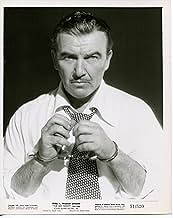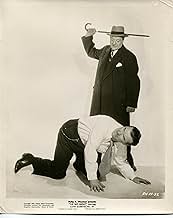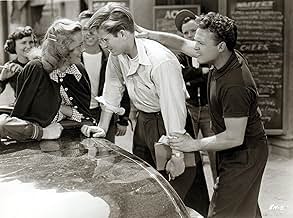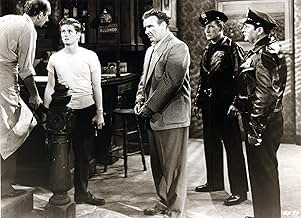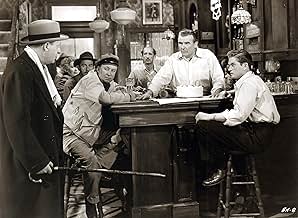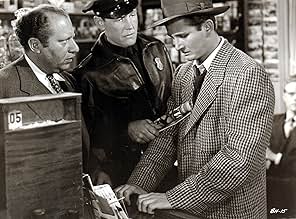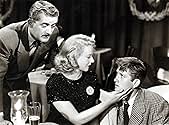CALIFICACIÓN DE IMDb
6.3/10
1.3 k
TU CALIFICACIÓN
Un adolescente alcanza la mayoría de edad mientras busca vengarse del hombre que golpeó a su padre.Un adolescente alcanza la mayoría de edad mientras busca vengarse del hombre que golpeó a su padre.Un adolescente alcanza la mayoría de edad mientras busca vengarse del hombre que golpeó a su padre.
- Dirección
- Guionistas
- Elenco
John Drew Barrymore
- George La Main
- (as John Barrymore Jr.)
Howland Chamberlain
- Flanagan
- (as Howland Chamberlin)
Emile Meyer
- Peckinpaugh
- (as Emil Meyer)
Mauri Leighton
- Terry Angelus
- (as Mauri Lynn)
Robert Aldrich
- Ringsider at Fight
- (sin créditos)
Walter Bacon
- Boxing Match Spectator
- (sin créditos)
Benjie Bancroft
- Bar Patron
- (sin créditos)
Robert Bice
- Taxi Driver
- (sin créditos)
Willie Bloom
- Boxing Match Spectator
- (sin créditos)
Chet Brandenburg
- Boxing Match Spectator
- (sin créditos)
Lane Chandler
- Printer
- (sin créditos)
Edmund Cobb
- Cop
- (sin créditos)
Opiniones destacadas
Uneven film that at times seems to drift. Still, there are genuinely compelling moments, as when burly dad LeMaine (Foster, in a fine performance) meekly submits to a brutal cane lashing that had me cringing. Why he's submitting remains a puzzle until the end. Because of the beating, Dad's insecure son George (Barrymore Jr.) spends the movie's remainder trying to avenge his father.
Beneath the revenge narrative, however, is really a rite-of-passage story. For example, in a not very believable opening, a cringing George is pounded in humiliating fashion by his teenage peers. We're given no explanation, nor does actor Barrymore physically resemble an easy mark. It's not a promising beginning. Then, in a much more persuasive scene, Dad casts a slightly disapproving eye over his nervous son's birthday cake (symbolic of the story). So the kid must prove himself not only to Dad, but to himself.
It's not a tight screenplay. Events more or less simply follow one another, tied together by the theme of vengeance. Happily, however, the narrative doesn't drag. Actor Barrymore Jr. had a rather brief career despite the pedigree. One thing for sure, he's certainly different looking. With a mop of unruly hair and slightly crooked mouth, he's no glamor boy. Nonetheless, his looks are perfect for the role, such that, when he dons a sport coat and hat, he still looks like a kid trying to take a big step up. All in all, the young actor does pretty well in the kind of difficult role that would later go to James Dean. I also like a de-glamorized Joan Lorring, who's a good match for him. My one real complaint is the way Al Judge (St. John) is written. His behavior is so crude and ugly, it's hard thinking of him as a respected sports writer. A racketeer would have been more credible and easier, so the scriptwriters must have had a reason.
Then too, the screenwriters, Butler and Lardner Jr., along with director Losey, were all blacklisted during Hollywood's commie hunting period. I suspect it was their leftist leanings that are responsible for one of the film's most arresting sequences. George goes to a nightclub where a drop-dead beautiful black songstress (Mauri Lynn) entertains. Afterward, he encounters her outside and is compelled to compliment her looks and talent. She glows at the flattering remark. Trouble is his heartfelt momentum carries over to the unspoken qualification "for a Negro woman". She grasps the unfortunate hanging-in-the-air racial reference, and is reminded of her not-fully-equal status. Thus, disappointment clouds her former glow. It's a beautifully played moment and quite powerful in emotional impact. I wonder what happened to that fine actress.
Anyway, the movie does have a number of effective noir touches, especially George's twilight escape through LA's towering industrial district. It's a mysterious world so much larger than himself. All in all, the film is oddly memorable, thanks, I think, to Barrymore's unusual presence. I know I sought it out on DVD, lo, so many years after having first seen it in a theatre.
(In passing—the burly guy sitting next to Barrymore and Bourneuf ringside at the fights is Robert Aldrich, the great director of such classics as Kiss Me Deadly {1955} and Attack {1956}.)
Beneath the revenge narrative, however, is really a rite-of-passage story. For example, in a not very believable opening, a cringing George is pounded in humiliating fashion by his teenage peers. We're given no explanation, nor does actor Barrymore physically resemble an easy mark. It's not a promising beginning. Then, in a much more persuasive scene, Dad casts a slightly disapproving eye over his nervous son's birthday cake (symbolic of the story). So the kid must prove himself not only to Dad, but to himself.
It's not a tight screenplay. Events more or less simply follow one another, tied together by the theme of vengeance. Happily, however, the narrative doesn't drag. Actor Barrymore Jr. had a rather brief career despite the pedigree. One thing for sure, he's certainly different looking. With a mop of unruly hair and slightly crooked mouth, he's no glamor boy. Nonetheless, his looks are perfect for the role, such that, when he dons a sport coat and hat, he still looks like a kid trying to take a big step up. All in all, the young actor does pretty well in the kind of difficult role that would later go to James Dean. I also like a de-glamorized Joan Lorring, who's a good match for him. My one real complaint is the way Al Judge (St. John) is written. His behavior is so crude and ugly, it's hard thinking of him as a respected sports writer. A racketeer would have been more credible and easier, so the scriptwriters must have had a reason.
Then too, the screenwriters, Butler and Lardner Jr., along with director Losey, were all blacklisted during Hollywood's commie hunting period. I suspect it was their leftist leanings that are responsible for one of the film's most arresting sequences. George goes to a nightclub where a drop-dead beautiful black songstress (Mauri Lynn) entertains. Afterward, he encounters her outside and is compelled to compliment her looks and talent. She glows at the flattering remark. Trouble is his heartfelt momentum carries over to the unspoken qualification "for a Negro woman". She grasps the unfortunate hanging-in-the-air racial reference, and is reminded of her not-fully-equal status. Thus, disappointment clouds her former glow. It's a beautifully played moment and quite powerful in emotional impact. I wonder what happened to that fine actress.
Anyway, the movie does have a number of effective noir touches, especially George's twilight escape through LA's towering industrial district. It's a mysterious world so much larger than himself. All in all, the film is oddly memorable, thanks, I think, to Barrymore's unusual presence. I know I sought it out on DVD, lo, so many years after having first seen it in a theatre.
(In passing—the burly guy sitting next to Barrymore and Bourneuf ringside at the fights is Robert Aldrich, the great director of such classics as Kiss Me Deadly {1955} and Attack {1956}.)
As someone who knew John Barrymore Jr. 25 years ago, I was heartbroken to see him early in his aborted film career. Though not as charismatic as James Dean would be just a couple of years later, he was certainly Dean's prototype in The Big Night. Perhaps with a better film and a less disturbed personality, Barrymore might have been a working Hollywood actor for many years to come. Anyway, what director Joseph Losey lacked here was the Los Angeles cityscape he used to full effect that same year in his retelling of Fritz Lang's M. The Big Night was screaming for a location project on downtown L.A.'s seedy, beaten down Bunker Hill, a neighborhood of crumbling Victorian mansions and apartment buildings with vertiginous stairways that provided so much atmosphere to other films, such as Kiss Me Deadly, Criss-Cross, The Exiles and, yes, M. Instead, the movie is stage bound and hemmed in by sets that never look convincing. With its rambling "a night in the life" plot line, The Big Night needed another character: a dark city of real streets, background lights, rambling old house, and dingy clubs and bars. In other words, the kind of verisimilitude that transports the viewer into the protagonist's world. The back lot, unfortunately, was a poor stand-in.
John Drew Barrymore Jr. Enters the "Family Tradition" and Dives Deeply and Emerges with an Over-the-Top Hot Performance that Desperately Demands a Non-Nepo Response.
Awkward, Nervously Angst-Ridden, He Performs Like His Life Depended-On-It, Trying Maybe a Beat too Hard.
But Director Losey Let Him, and other Things Here Go Un-Checked.
Relying on the Dark Underbelly of the City its Megalopolis Tendency to Erode and Crush the "Little People", that by Fate, Inhabit the Arteries of the "Concrete Jungle" Clinging to Every Vine and Crevice for Survival.
The Movie seems a Bit-Rushed (anticipating Losey's life in forced-flux), compared to Other more Solid Cinema Unleashed by the Cynical, Left-Leaning "Auteur" that was Victimized by the "Red-Scare" and an Out-of-Control Political Corruption that Failed to See the Unconstitutional Error of Their Ways in Real Time.
The Film, in 1951 was Made when Film-Noir itself was the Victim of a "System" on the Warpath to Sanitize anything in America that Looked Like a Trend Away from the Idealistic, Road-Map Created for a Guide of What Was and What Was Not Acceptable to the Clergy, Law Enforcement and a Fake Moral-Compass Pointing the Way of "Americanism" by Standards Made-Up On-the-Fly to Fit the Form of a Pre-Conceived Conservative Society that Toed-the-Line, Obeyed Orders from the Top and Didn't Ask Questions. After All, "They" were Looking-Out-For-You.
Losey, and Others were Free-Thinking, Empathetic, and were More Interested in the Collective Good and Not the Collective as Sub-Servant.
A True Film-Noir Founder and Pioneer. "The Big Night" is just 1 of His Many Contributions to the Growing, Spontaneous, Sub-Genre that Allowed 1940's Creative Film-Makers and Social Commentators to Vent and Vocalize a Point of View that was Hardly Main-Stream.
Like All of Joseph Losey Films...
Worth a Watch.
Awkward, Nervously Angst-Ridden, He Performs Like His Life Depended-On-It, Trying Maybe a Beat too Hard.
But Director Losey Let Him, and other Things Here Go Un-Checked.
Relying on the Dark Underbelly of the City its Megalopolis Tendency to Erode and Crush the "Little People", that by Fate, Inhabit the Arteries of the "Concrete Jungle" Clinging to Every Vine and Crevice for Survival.
The Movie seems a Bit-Rushed (anticipating Losey's life in forced-flux), compared to Other more Solid Cinema Unleashed by the Cynical, Left-Leaning "Auteur" that was Victimized by the "Red-Scare" and an Out-of-Control Political Corruption that Failed to See the Unconstitutional Error of Their Ways in Real Time.
The Film, in 1951 was Made when Film-Noir itself was the Victim of a "System" on the Warpath to Sanitize anything in America that Looked Like a Trend Away from the Idealistic, Road-Map Created for a Guide of What Was and What Was Not Acceptable to the Clergy, Law Enforcement and a Fake Moral-Compass Pointing the Way of "Americanism" by Standards Made-Up On-the-Fly to Fit the Form of a Pre-Conceived Conservative Society that Toed-the-Line, Obeyed Orders from the Top and Didn't Ask Questions. After All, "They" were Looking-Out-For-You.
Losey, and Others were Free-Thinking, Empathetic, and were More Interested in the Collective Good and Not the Collective as Sub-Servant.
A True Film-Noir Founder and Pioneer. "The Big Night" is just 1 of His Many Contributions to the Growing, Spontaneous, Sub-Genre that Allowed 1940's Creative Film-Makers and Social Commentators to Vent and Vocalize a Point of View that was Hardly Main-Stream.
Like All of Joseph Losey Films...
Worth a Watch.
Joseph Losey's The Big Night is a film noir that's also, like Moonrise and Talk About A Stranger, a coming-of-age story. The young male undergoing his transformational journey is John Barrymore, Jr., son of the Great Profile and father of Drew. His film career was not high-profile, as he inherited the family disposition toward chemical dependency (blood will tell). But here, boasting a luxuriantly healthy crown of hair, he gives a surprisingly intense yet controlled performance. His big night happens to be his 16th or 17th birthday, when his barkeep father is brutally beaten and publicly humiliated by a local sportswriter (Losey's staging is unflinching). Frustrations about his own Hamlet-like ditherings and confusions impel him to seek revenge on his father's behalf, and, gun in pocket, he sets out into a nightscape of prize fights, gin mills and the walk-up flats of casually met strangers. While Losey's sympathies lie with Barrymore, it's always clear that the emergent man is still a callow stripling, incapable of apprehending the complex reality he crashes into, like a fatted calf in a china shop. Though the director refrains from pushing the conclusion to where it might logically go -- he retreats into sentimentality and sententiousness -- The Big Night still scores as a provocative, moodily shot film.
Lots of accused Communists involved in this film, and one spy!
Yes - John Barrymore Jr. Was paid and given an expense account to spy on poor Joseph Losey, the director. Barrymore later confessed to Losey, who forgave him, and the two enjoyed fabulous meals on Barrymore's FBI expense account.
George La Main (John Drew Barrymore) is Georgie, who watches his father caned and beaten brutally by a sportswriter, Al Judge. We don't know why, just that he takes it.
Georgie, only 17, is traumatized and wants revenge. This quest takes him to a prize fight, nightclubs, and apartments in walk-ups in the seedier parts of Los Angeles as apropos the noir atmosphere. What Georgie learns will take him out of his youth. It's disillusioning but it's reality, like it or not.
This is Losey's last film before blacklisting causes him to leave the country. The role of Georgie is a James Dean-type role. Georgie is portrayed as kind of a dork though Barrymore was better looking than this. He does a good job as the tortured young man.
Preston Foster, Howard St. John, Joan Lorring, and Dorothy Comingore (in her last role) provide good support.
In the end, the film, though uneven, shows that secrets and lies can hurt, and people can betray and disappoint you; sadly, it's all part of life's tapestry.
Certainly no one knew that better than Losey, the ruined Comingore, uncredited writers Lardner and Butler, and actor Howard Chamberlin, all part of this film and blacklisted.
Yes - John Barrymore Jr. Was paid and given an expense account to spy on poor Joseph Losey, the director. Barrymore later confessed to Losey, who forgave him, and the two enjoyed fabulous meals on Barrymore's FBI expense account.
George La Main (John Drew Barrymore) is Georgie, who watches his father caned and beaten brutally by a sportswriter, Al Judge. We don't know why, just that he takes it.
Georgie, only 17, is traumatized and wants revenge. This quest takes him to a prize fight, nightclubs, and apartments in walk-ups in the seedier parts of Los Angeles as apropos the noir atmosphere. What Georgie learns will take him out of his youth. It's disillusioning but it's reality, like it or not.
This is Losey's last film before blacklisting causes him to leave the country. The role of Georgie is a James Dean-type role. Georgie is portrayed as kind of a dork though Barrymore was better looking than this. He does a good job as the tortured young man.
Preston Foster, Howard St. John, Joan Lorring, and Dorothy Comingore (in her last role) provide good support.
In the end, the film, though uneven, shows that secrets and lies can hurt, and people can betray and disappoint you; sadly, it's all part of life's tapestry.
Certainly no one knew that better than Losey, the ruined Comingore, uncredited writers Lardner and Butler, and actor Howard Chamberlin, all part of this film and blacklisted.
¿Sabías que…?
- TriviaAccording to interviews that director Joseph Losey gave in the mid-1970s to Michel Ciment, the FBI wanted to spy on him in Europe, where he relocated to work after being blacklisted by Hollywood because of his political activities. So they paid John Drew Barrymore (who became a good friend after this movie) to furnish information about Losey's political activities, if any, in London. Barrymore later met Losey in London and confessed to him about the money and expense account the FBI had given him to spy on Losey. Losey, recalling that the young actor had been under tremendous pressure at the time, forgave him and, in fact, suggested that they have several lavish meals together and put the cost on Barrymore's FBI expense account, which they promptly did.
- ErroresThe magazine racks outside the corner store are mostly issues contemporary to 1951, with one glaring exception. A copy of the famous first issue of The New Yorker (published in 1925).
- Citas
Peckinpaugh: Next time you see somebody drop money, don't think about it so long before you decide to give it back.
- ConexionesFeatured in Vampira: The Big Night 1951 (1956)
Selecciones populares
Inicia sesión para calificar y agrega a la lista de videos para obtener recomendaciones personalizadas
- How long is The Big Night?Con tecnología de Alexa
Detalles
- Fecha de lanzamiento
- País de origen
- Idioma
- También se conoce como
- Die Nacht der Wahrheit
- Locaciones de filmación
- 218 East 12th Street, Downtown, Los Ángeles, California, Estados Unidos(George goes to the old St. Joseph's Church - destroyed by fire and demolished in 1983)
- Productora
- Ver más créditos de la compañía en IMDbPro
- Tiempo de ejecución
- 1h 15min(75 min)
- Color
- Relación de aspecto
- 1.37 : 1
Contribuir a esta página
Sugiere una edición o agrega el contenido que falta



